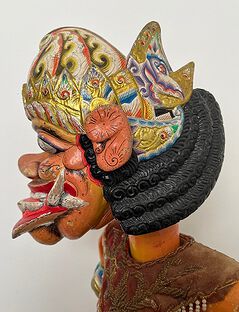Kala
| Title | Kala - (Batara) - All stories |
|---|---|
| Other names | |
| Size | 65 cm |
| Personal data | Batara Kala is a God, the son of Batara Guru and Goddess Uma and was born in the middle of the ocean. Batara Kala took the form of a giant with a scary face. Batara Kala was instructed to live in Nusakambangan and then marry Batari Durga. |
| Appearance | Batara Kala has large eyes, an arcuate nose with an open mouth. Bemarjam with an eagle on his back, God crouching, hair down, hair on the chest moving only the front hand, dressed in the kingdom of giants. |
| Collection | Private collection |
Kala - (Batara) - All stories
In the Tattwa book, it is said that one day Lord Shiva and his wife Dewi Uma took a walk by the sea. Unexpectedly, Dewi Uma's cloth was exposed because the wind was blowing so that her calf was visible. Seeing this, Dew Siwa's desire arose to invite Goddess Uma to have sexual intercourse, but the Goddess refused because such an act was not suitable for the Gods of heaven.
Finally, the two of them returned to heaven, and Lord Shiva's kama water fell into the sea where it was later discovered by Lord Brahma and Vishnu. The seed was then created into a giant who growled and asked who his parents were. With instructions from Lord Brahma and Lord Vishnu, the giant found out that his parents were Lord Shiva and Goddess Uma. So the giant immediately went to heaven to ask for recognition from Lord Shiva. Before Lord Shiva recognized the giant as his son, he first had to cut off his long fangs so he could see the full form of his parents. These conditions were met, and finally Lord Shiva recognized the giant as his son, who was then given the title Batara Kala.
Meanwhile, in another version it is stated that Batara Kala was the son of Batara Guru. It is said that one day before dusk, Batara Guru and Dewi Uma went to entertain themselves by riding Andini's ox in the sky to see the natural scenery. Accidentally, while above the ocean, the wind uncovered Goddess Uma's cloth. Batara Guru was tempted to see his wife's calves, he then seduced Dewi Uma and invited her to make love right then and there on the ox Andini's platform. However, Dewi Uma refused her husband's invitation because she felt that it was inappropriate. Batara Guru kept trying to seduce her, but Dewi Uma kept trying to avoid him. Finally, because he could no longer hold back his desire, Batara Guru's kama water (semen) came out and fell into the sea. Dewi Uma's rejection made Batara Guru upset and angry. They then argued. In a state of anger, Dewi Uma said that Batara Guru's actions were only worthy of being done by creatures with long fangs. What Dewi Uma said came true, Batara Guru's anger peaked after he realized his fangs grew longer. Batara Guru responded by cursing Dewi Uma to be a racist. Dewi Uma, who was already a monster by Batara Guru, exchanged her soul with Sang Hyang Permoni, who had a beautiful face but was jealous and spiteful. Goddess Uma was then given the title of Batari Durga.
When Batara Guru's semen fell into the sea, a child was born in the form of a very scary giant. The giant went to Jonggringsaloka's heaven and went berserk and asked for three wishes. The giant asked to be recognized as a child, given a name and given a wife. Batara Guru recognized the monster as his son and was given the name Batara Kala. Batara Kala was then mated with Goddess Uma who had become a monster called Batari Durga. The two were then placed in the heaven of Setra Gondomayit and controlled all kinds of jinn, gandharwa and other ethereal beings.
When Batara Kala asked for food, Batara Guru gave food but determined, namely:
1. Ontang-anting child (only child/only puppet)
2. The Five Pandavas are all five sons and five daughters
3. Kedono-kedini, children are male and female.
That is the food of Batara Kala who is commonly called Sukerta child (Java). Therefore, according to the beliefs of the Javanese community, to avoid the Batara Kala season, Sukerta children should be treated by holding puppet shows with Murwakala or Ruwatan plays.
Blog: Hadisukirno – Yogyakarta 2012


